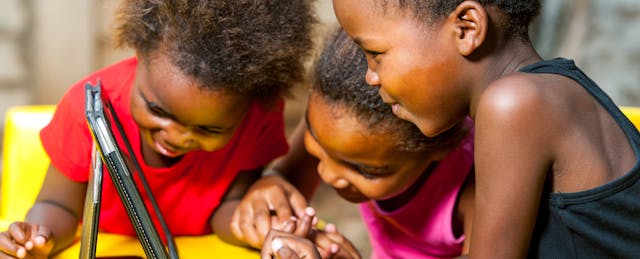In the course of developing tools to help children in Africa build literacy and numeracy skills, Sooinn Lee learned something herself. “We had a photo function in our tool that lets children take pictures,” she says. “But none of the children had seen a camera before, and had no concept of what to do with the feature. So we took it out.”
Understanding how cultural differences inform product design was one of the lessons that the Korean-born entrepreneur picked up during the past two months. Lee is the CEO of Enuma, a Berkeley, Calif.-based edtech startup that was one of the 11 semi-finalists competing in the XPRIZE Global Learning Challenge.
Now the competition is in its final stage—and Lee’s team is still standing. Today, at the Social Good Summit that accompanies the United Nation’s annual General Assembly in New York, XPRIZE unveiled the five finalists.
Besides Enuma, two other finalists hail from the U.S. There’s Robo Tutor, an eponymous project from Carnegie Mellon University that seeks to combine speech recognition technology and machine learning with the school’s long history of research in computer-based tutoring. (That effort involves 120 students, faculty and post-doctoral students, according to WESA, Pittsburgh’s NPR affiliate.) Another team is Curriculum Concepts International, a New York-based development shop that has built learning tools for schools, publishers, foundations and corporate clients.
There’s also onebillion, a collaborative effort of developers and educators based in the U.K., Malawi and Tanzania. And from Bangalore is Chimple, which is taking a game-based approach to teaching literacy and math on tablets.
Each of the finalists will receive $1 million to test their software with an estimated 4,000 children across 150 villages in Tanzania. Over the next 15 months, the team that can show the greatest gains in reading, writing and arithmetic will be named the grand winner—and take home the $10 million prize.
In all, 198 teams participated in the challenge, first announced in Sept. 2014.
Enuma’s Lee say she’s been working on her team’s submission, Kitkit School, since 2015. So far the app, which includes a library of games, songs, videos and books in English and Swahili, has been tested with about 1,200 children across schools and community centers in Tanzania and Kenya.
“The success of XPRIZE is really important for the educational ecosystem, and to realize the hope for affordable education,” says Lee. She knows that other efforts to bring educational technology to the developing world has had a mixed track record. MIT professor Nicholas Negroponte tried—and failed—to give one laptop per child in the mid-2000’s. (A study found it had negligible effects on test scores and student attendance.) India’s attempt to build and distribute a $35 tablet to teachers and students also fizzled.
“Many people had high hopes of tablet-based education as an accessible tool that can be delivered all over the world,” observes Lee. “The hype never lived up, but I still strongly believe that with the affordable price of hardware and new solar charging systems, [learners across the world] can get the quality content that U.S. children enjoy.”
Field tests for this final round will start in November 2017 and run through February 2019. XPRIZE has enlisted UNESCO, the World Food Programme and the Tanzanian government to set up and run the pilots. (The finalists are restricted from participating in or overseeing these tests.) Google also will donate 8,000 Pixel C tablets to run the apps.
After the competition, each finalist is required to open-source their code and content so that anyone can reuse and remix their apps.
Better known for its competitions to spur space and ocean exploration, the XPRIZE has another active education challenge, for adult literacy programs. Finalists for that $7 million competition, supported in large part by the Barbara Bush Foundation, will be announced in May 2018.
Financiers for the Global Learning XPRIZE include high-profile technologists such as Elon Musk and Scott Hassan, along with Tony Robbins’ foundation and the Dick and Betsy DeVos Family Foundation.


